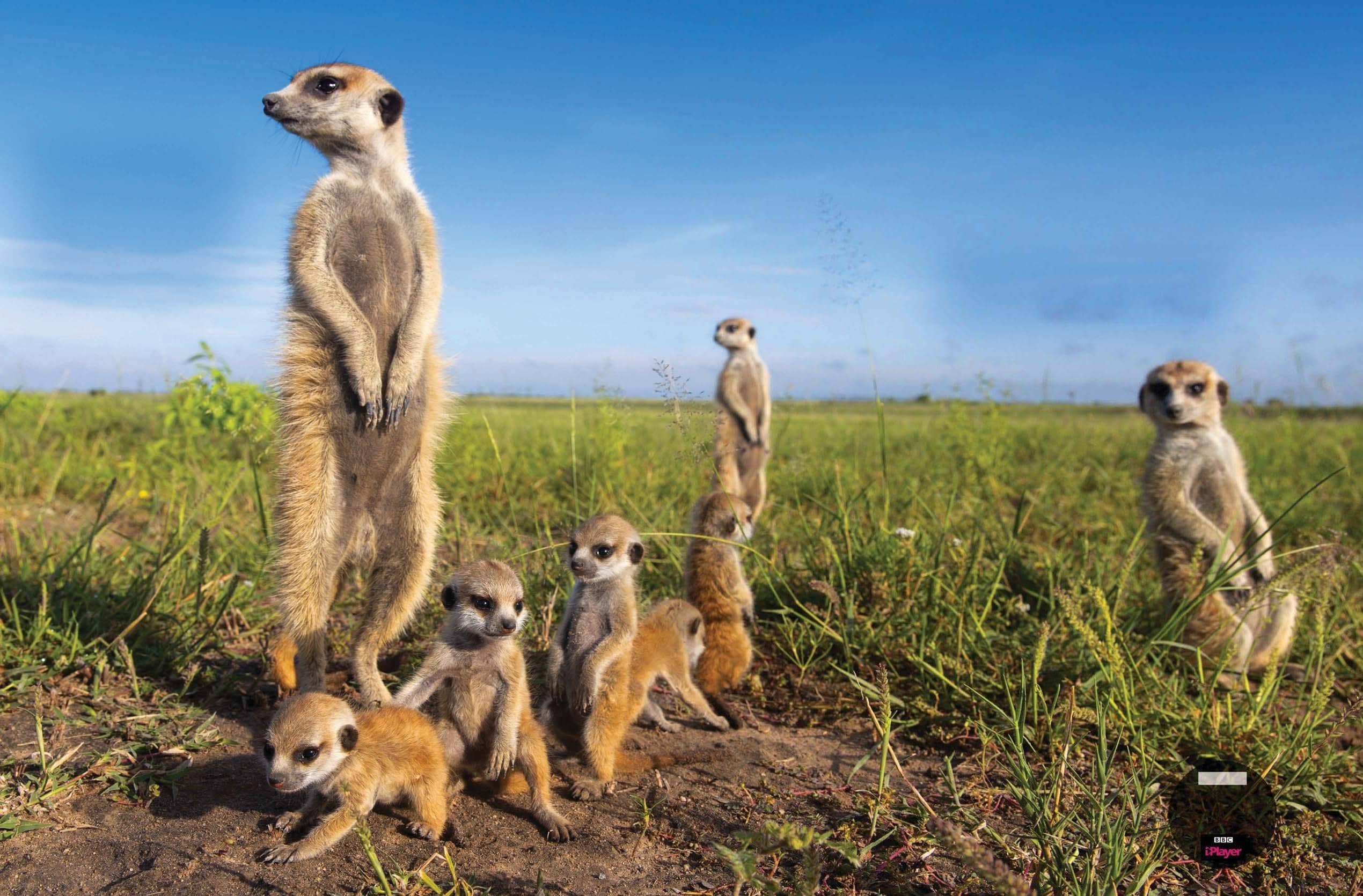Prøve GULL - Gratis
Mob rule
BBC Wildlife
|July 2021
In the well-defined strata of meerkat society, Mum’s firmly in charge – but, despite the dominance of a fierce matriarch, it takes a mob to raise a litter of hungry, playful pups.

Meerkat mother Maghogho stands imperiously above her five young pups while their father (rear) and her subadult son (far right) stand sentinel. After about two weeks in the natal burrow, from early February the curious infants had begun to peek out. Soon they were joining the adults in ritual sunbathing sessions. “Each morning they’d emerge and expose their mostly hairless bellies to the rays like solar panels,” recalls Suzi, who photographed this family album in northern Botswana’s Makgadikgadi Pans, on the fringes of the Kalahari Desert.

These three pups’ intense expression is surely hunger, as they await the return of their father with a morsel of food – typically a beetle or insect larva. Maghogho is conspicuous by her absence: an alpha female leaves almost all parenting responsibilities to other members of her mob. “A beautiful thing about meerkat society is that all adults babysit and feed the pups during the day – all except Mum, who leaves them to it,” explains Suzi.

The approaching dusk prompts a dash back to the burrow, with Dad chivvying along his pups, picking up and carrying any tardy offspring who lags behind. “It’s not a stroll home – it’s a race,” says Suzi. To capture these eye-level shots, she had to get down low – very low. “I spent weeks on my belly,” she recalls. “You don’t stand with these guys. You barely even sit. But it was entrancing to enter the meerkats’ world at their own level.”
Denne historien er fra July 2021-utgaven av BBC Wildlife.
Abonner på Magzter GOLD for å få tilgang til tusenvis av kuraterte premiumhistorier og over 9000 magasiner og aviser.
Allerede abonnent? Logg på
FLERE HISTORIER FRA BBC Wildlife

BBC Wildlife
“Our canoe was nearly sunk by a hippo”
Hippos in Niger
3 mins
March 2026

BBC Wildlife
Why does Australia have such weird animals?
AUSTRALIA IS A LONG WAY FROM anywhere and has been for a very long time. The landmass definitively separated from the supercontinent of Gondwana around 40 million years ago and, since then, has existed - as a big blob in the middle of an even bigger ocean - in glorious geographical isolation.
2 mins
March 2026

BBC Wildlife
Which country has the fewest native animals?
AT AROUND 61KM² SAN MARINO, IN Europe, is one of the world's smallest countries. Entirely landlocked, it is surrounded by Italy.
1 min
March 2026

BBC Wildlife
Why do some species sunbathe?
RING-TAILED LEMURS ARE FAMED FOR their 'sun-worshipping' posture, legs and arms outstretched to reveal their pale bellies. Like humans, they do it to save energy and boost health. Sunlight is necessary to many bodily processes. As a source of vitamin D it's required to maintain bone and muscle health. It is also related to the production of serotonin, the chemical that regulates mood, sleep and stress response.
1 mins
March 2026

BBC Wildlife
ALL YOU EVER NEEDED TO KNOW ABOUT THE Piranha
PIRANHAS HAVE A REPUTATION as some of the most dangerous freshwater hunters: terrifying predators capable of devouring a large mammal in mere minutes.
3 mins
March 2026

BBC Wildlife
EAGLES LANDING
Eagle owls were once heavily persecuted. But thanks to a new initiative, these magnificent birds are reclaiming a wetland home
7 mins
March 2026

BBC Wildlife
Do wild guinea pigs exist?
GUINEA PIGS, WHICH ARE NOT pigs and not from Guinea, are domesticated rodents that do not exist in the wild.
1 min
March 2026

BBC Wildlife
SNAP-CHAT: THE INSIDE WORLD OF WILDLIFE PHOTOGRAPHY
Boris Belchev on birds, batteries and battling bears with pop music
3 mins
March 2026

BBC Wildlife
Does anything live in the Bermuda Triangle?
THE BERMUDA TRIANGLE, IN THE NORTH Atlantic Ocean, has become infamous for the planes and ships that are said to have vanished without a trace while travelling through the area.
1 min
March 2026

BBC Wildlife
Do animals have different blood types?
HUMANS HAVE FOUR MAIN BLOOD GROUPS: A, B, AB and O.
1 min
March 2026
Translate
Change font size
